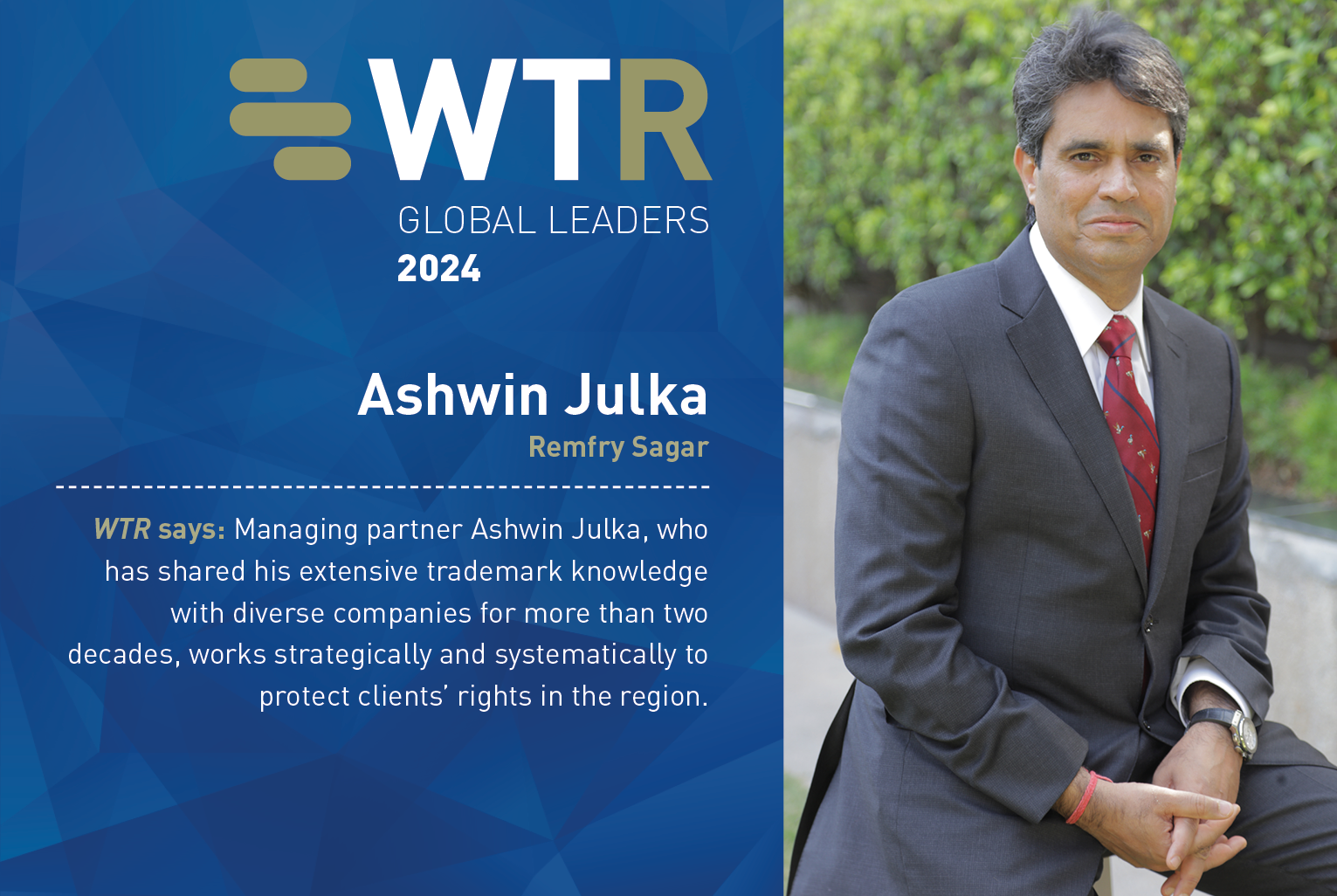Ashwin Julka
What inspired you to pursue a career in intellectual property, and what advice do you have for aspiring practitioners?
It was rather fortuitous. In my younger years I wanted to emulate my father, a bureaucrat. Having majored in economics at university, I took up the study of law to prepare for the civil services examination. But destiny had other plans. Upon graduation, I decided to pursue a career in law and landed at Remfry & Sagar in 1994. I soon found that I tremendously enjoyed my work as an IP lawyer.
That said, early in my career few were aware of this line of practice and not many pursued it as their first-choice career. Today, intellectual property is a powerful buzzword and young lawyers are actively looking to become experts. Rapid advancements in and adoption of frontier technologies – AI, Big Data and cloud computing – are changing the rules of commerce and life as we know it, challenging the adequacy of existing statutes and jurisprudence. For hard-working, nimble and creative minds, a career in IP law is full of opportunity.
The Indian IP Office (IPO) is registering a record number of IP filings. What are the global business implications?
In the last decade, the number of trademark applications has grown by 1.3 times (India ranks third globally) and design filings have risen by more than 1.5 times. Patent filings have nearly doubled; India ranks sixth in the world in this area. But the true story of IP potential and growth emerges when you look at filing numbers in the context of global figures. For instance, 82,811 patents were filed in India last year but the figures in Japan were nearly four times that, and US figures more than seven. Given India’s young, digital-savvy population – and its market growth at over 6.5% – I believe we are seeing the tip of the filing iceberg.
Protection of existing IP rights and enforcement deserve equal focus. The IPO has transformed in recent years – reflected in the over 100,000 patents granted last year. Efforts are also on clearing trademark opposition backlogs and reducing patent disposal timeframes from the current four-to-five-year period. However, quicker processing must not come at the cost of quality decision making, so the IPO has its work cut out.
The tremendous success of specialist IP courts at the Delhi and Madras High Courts is noteworthy. Simplified procedures and strict timelines have nearly halved adjudication periods at these courts. One can expect a final order within one to three years – compared to three to five previously. Combine that with the increasing propensity of granting damages – the Ericsson-Lava SEP lawsuit made headlines last month with a damages award of 2.4 billion rupees (approximately US$29 million) – and one can emphatically say that Indian IP jurisprudence is quickly maturing.
Supported by the government’s efforts to create favourable business policy, India’s IP ecosystem is set to boom in the coming decade.
How is your firm attracting and retaining key talent?
Remfry & Sagar is proud to have one of the lowest attrition rates in the industry – less than 3%. Over one third of its members have been at the firm for more than 10 years, resulting in stability for our clients.
We are merit-driven and many factors make us an appealing choice. Our reputation as an industry leader, remuneration, the value we attach to each member’s potential, the career path we envisage for them and emphasis on teamwork create an ideal ecosystem for individuals to thrive. From crafting IP solutions for leading global corporations to working with industry bodies and the government to shape IP discourse and policy, we offer a holistic environment for professional development. Hard work and accomplishment are given their due, but equally, pride stems from maintenance of a fair, ethical workplace that promotes a healthy work-life balance. Flexible working hours and tech tools ensure that attorneys can log in to the office network from wherever convenient.
Retaining talent is difficult, particularly in India where there is limited supply of quality professionals. But we have tried to create an open and supportive work culture, and the statistics speak for themselves.
As managing partner, what does inspiring and effective leadership look like to you?
There is no better way to lead than by example. Also, recognising everyone’s unique strengths and weaknesses and building teams that work together to capitalise on every member’s strength are crucial skills. The key is effective communication with employees in terms of organisational goals and feedback.
Ashwin Julka
Managing Partner
[email protected]
Ashwin Julka is managing partner at Remfry & Sagar, one of India’s oldest and largest IP firms. He leads a team of more than 275 employees, including 120 attorneys, and has bachelor’s degrees in economics and law. Mr Julka’s expertise spans the full spectrum of intellectual property, particularly trademark law and patent policy. He is active in various IP organisations and is well known in the global IP sphere.
